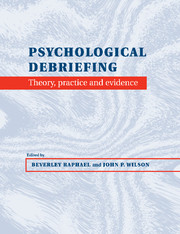Book contents
- Frontmatter
- Contents
- List of contributors
- Introduction and overview: Key issues in the conceptualization of debriefing
- Part I Key conceptual framework of debriefing
- Part II Debriefing: models, research and practice
- 5 Critical Incident Stress Management and Critical Incident Stress debriefings: evolutions, effects and outcomes
- 6 Debriefing with emergency services: Critical Incident Stress Management
- 7 Debriefing and body recovery: war grave soldiers
- 8 Debriefing and body recovery: police in a civilian disaster
- 9 Debriefing after massive road trauma: perceptions and outcomes
- 10 Debriefing and motor vehicle accidents: interventions and outcomes
- 11 Debriefing with service personnel in war and peace roles: experience and outcomes
- 12 Debriefing post disaster: follow-up after a major earthquake
- 13 Debriefing after disaster
- 14 Children and debriefing: theory, interventions and outcomes
- 15 Debriefing adolescents after critical life events
- Part III Adaptations of debriefing models
- Part IV Debriefing overview and future directions
- Conclusion: debriefing – science, belief and wisdom
- Index
8 - Debriefing and body recovery: police in a civilian disaster
from Part II - Debriefing: models, research and practice
Published online by Cambridge University Press: 06 January 2010
- Frontmatter
- Contents
- List of contributors
- Introduction and overview: Key issues in the conceptualization of debriefing
- Part I Key conceptual framework of debriefing
- Part II Debriefing: models, research and practice
- 5 Critical Incident Stress Management and Critical Incident Stress debriefings: evolutions, effects and outcomes
- 6 Debriefing with emergency services: Critical Incident Stress Management
- 7 Debriefing and body recovery: war grave soldiers
- 8 Debriefing and body recovery: police in a civilian disaster
- 9 Debriefing after massive road trauma: perceptions and outcomes
- 10 Debriefing and motor vehicle accidents: interventions and outcomes
- 11 Debriefing with service personnel in war and peace roles: experience and outcomes
- 12 Debriefing post disaster: follow-up after a major earthquake
- 13 Debriefing after disaster
- 14 Children and debriefing: theory, interventions and outcomes
- 15 Debriefing adolescents after critical life events
- Part III Adaptations of debriefing models
- Part IV Debriefing overview and future directions
- Conclusion: debriefing – science, belief and wisdom
- Index
Summary
Creation can come from the experience of destruction if lessons are learnt and practice changed.
(Gibson (1996, p. 57))EDITORIAL COMMENTS
This chapter provides a detailed discussion of Alexander's experience and research in the management of two groups of police officers involved in body handling and recovery after a major oil rig disaster. Of particular interest are the structures and processes that were set in place and appear to have contributed to positive outcomes. There is also the advantage for a programme of previous occupational health and safety research that allowed for a matched control group of officers to be identified. The structures included: careful preparation, including: support for the use of humour, and talking with colleagues; provision of defusing and debriefing by experienced and skilled senior police; backup by the specialist mental health clinicians who were well known to the group, including the author, from previous work with them; pairing of younger and older workers; and a supportive general culture. These workers showed positive outcomes three months and three years later, believing that their work had enhanced their skills and self-confidence. They felt competent to do this type of work again. The workers reported the use of black humour and talking to colleagues as helpful strategies; good morale, interpersonal relationships and eYcient organization were also seen to contribute positively. Keeping things to oneself was seen as neither helpful nor popular.
Keywords
- Type
- Chapter
- Information
- Psychological DebriefingTheory, Practice and Evidence, pp. 118 - 130Publisher: Cambridge University PressPrint publication year: 2000
- 4
- Cited by

